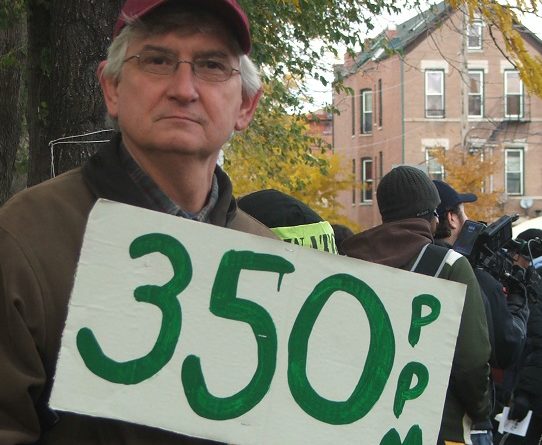February 18, 2017 – Will Chicago Divest from Fossil Fuels?
![]() Does Chicago have the guts to pull the plug on fossil fuel investment?
Does Chicago have the guts to pull the plug on fossil fuel investment?
Let’s see if I can connect some dots here. According to the National Aeronautics and Space Administration (NASA) Goddard Institute for Space Studies,
Earth’s 2016 surface temperatures were the warmest since modern recordkeeping began in 1880, according to independent analyses by NASA and the National Oceanic and Atmospheric Administration (NOAA).
Globally-averaged temperatures in 2016 were 1.78 degrees Fahrenheit (0.99 degrees Celsius) warmer than the mid-20th century mean. This makes 2016 the third year in a row to set a new record for global average surface temperatures.
Then, just yesterday, a man named Scott Pruitt, who was formerly Oklahoma’s attorney general, was sworn in as the new head of the US EPA:
Pruitt begins what is likely to be a controversial tenure with a clear set of goals. He has been outspoken in his view, widely shared by Republicans, that the EPA zealously overstepped its legal authority under President Barack Obama, saddling the fossil-fuel industry with unnecessary and onerous regulations.
So, if you’re like the folks at the American Association for the Advancement of Science, who state in a paper called What We Know that
Based on well-established evidence, about 97% of climate scientists have concluded that human-caused climate change is happening. This agreement is documented not just by a single study, but by a converging stream of evidence over the past two decades from surveys of scientists, content analyses of peer-reviewed studies, and public statements issued by virtually every membership organization of experts in this field.
you’re looking in the mirror this morning and saying, “We. Are. So. Screwed.”
And you would be right. But that’s only if you think the federal government is the sole means by which we can protect our planet. Just this past December, a group called divestinvest.org published a report called The Global Fossil Fuel Divestment and Clean Energy Investment Movement. The executive summary said, in part,
On the one-year anniversary of the Paris climate agreement, the value of assets represented by institutions and individuals committing to some sort of divestment from fossil fuel companies has reached $5 trillion. To date, 688 institutions and 58,399 individuals across 76 countries have committed to divest from fossil fuel companies, doubling the value of assets represented in the last 15 months. Pension funds and insurance companies now represent the largest sectors committing to divestment, reflecting increased financial and fiduciary risks of holding fossil fuels in a world committed to stay below 2° Celsius warming.
The main driver behind the divestment movement is 350.org, under the banner of Go Fossil Free. The mission is to
- Immediately freeze any new investment in fossil fuel companies;
- Divest from direct ownership and any commingled funds that include fossil fuel public equities and corporate bonds within 5 years
- End their fossil fuels sponsorship
Among the cities committed to this action are Seattle, WA; Portland, OR; Kansas City, MO; Berlin, Germany; Stockholm, Sweden; and Paris, France. Institutions include the Canadian Medical Association, The Field Museum in Chicago, Georgetown University, Oxford University in the UK, Rockefeller Brothers Fund, Stanford University, and the United Church of Christ.
All told, the approximate value of the institutions divested amounts to more than 5 trillion dollars. Yes, you read that right.
And now, the City of Chicago is thinking of adding itself to the list. The local chapter of 350.org, 350 Chicago, explains the importance of the initiative:
We can only burn 565 more gigatons of carbon dioxide and stay below 2°C of warming – anything more than that risks catastrophe for life on earth. Fossil fuel corporations now have 2,795 gigatons in their coal, oil, and gas reserves, five times the safe amount. These companies must keep 80% of their fossil fuels underground, meaning that 80% will become stranded assets. From a financial perspective, current developments raise serious questions as to the long-term wisdom of retaining investments in entities holding these stranded assets as their chief source of wealth.
So, at the urging of 350 Chicago, thirty-nine aldermen, led by the progressive caucus, signed a resolution in December to have the Chicago pension funds stop new investments in fossil fuel companies. WTTW’s Chicago Tonight quoted Alderman John Arena of the 45th Ward:
“They’re not stable companies,” he said. “They’re very old-thinking and we need to say ‘Look, they are going to exist and we’ll need fossil fuels in the short term,’ but we have to be thinking as a city about what’s sustainable in the long term. We have a moral responsibility to set an example with our taxpayer dollars.”
Yet there are those who say that divesting in fossil fuel companies on a public level might not be more than symbolic, given that so much trading is done in private. Matthew Cunningham-Cook writes in Al Jazeera America that:
pension funds and endowments, the entities largely targeted by the 350.org campaign, invest hundreds of billions of dollars in privately traded securities, such as hedge funds and private equity — vehicles that are invested at all levels of the fossil fuel economy. (In particular, hedge funds and private equity have been found to be the key financial backers of the fracking boom.)
In Chicago, the City Council Finance Committee was set to discuss this issue on Tuesday, February 21. However, that discussion is not on the agenda. We welcome Alderman John Arena to The Mike Nowak Show this morning, along with Melissa Brice from Chicago 350, to discuss where City Council goes from here.

